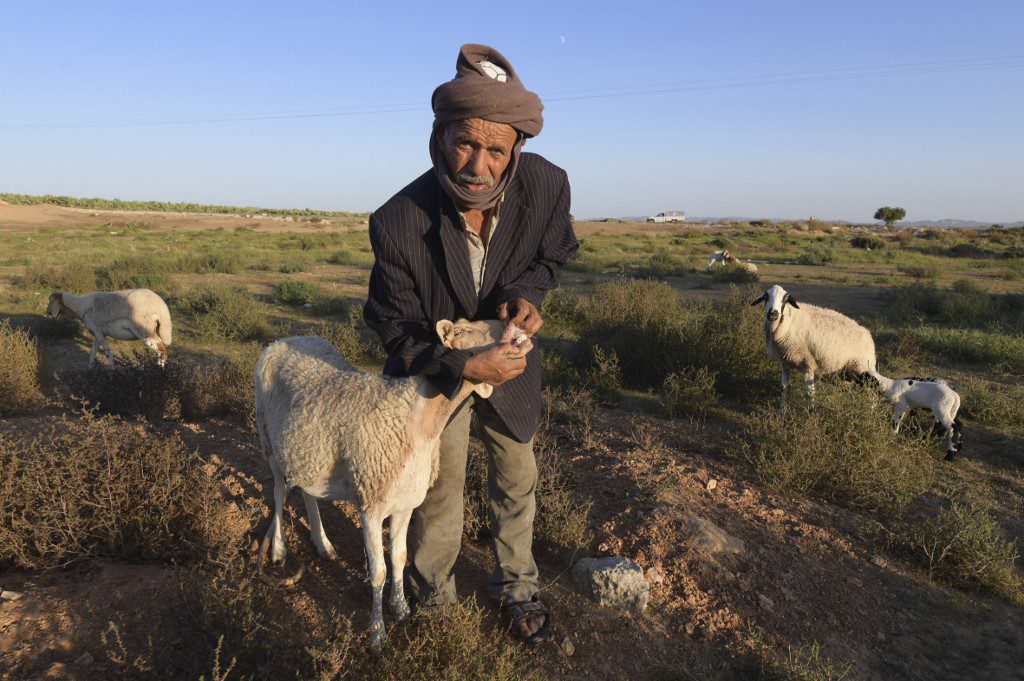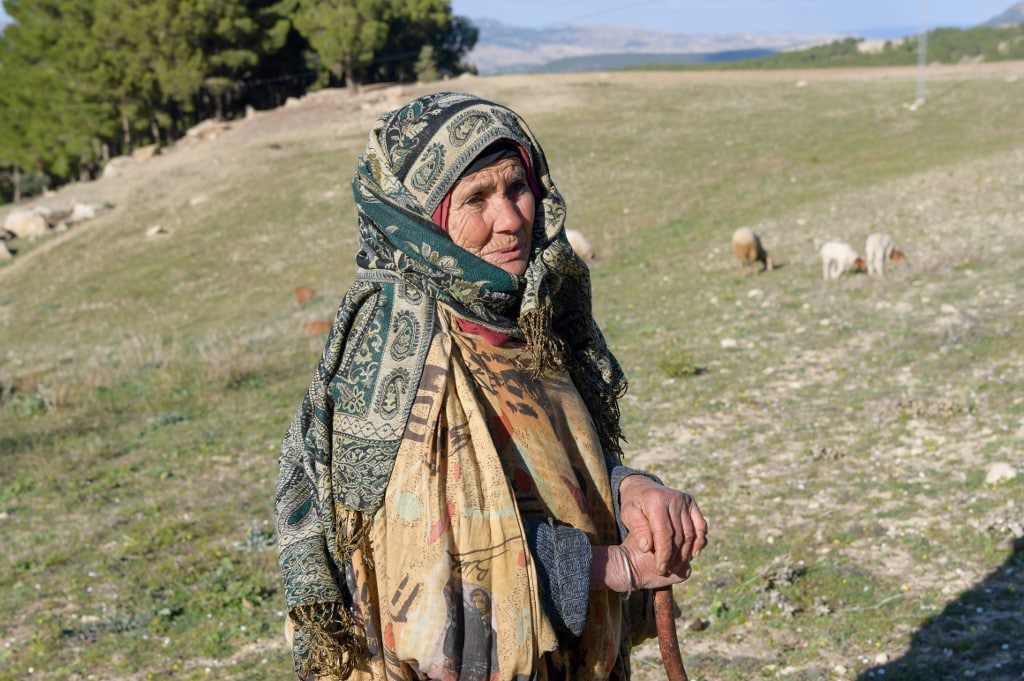
Hakim Marzouki
This year, terrorism prevented Tunisians from organizing a special and unique festival. Although organized on annually in al-Wasaeya village near Sbeitla, the Shepherd’s festival was canceled due to declaring the whole area as a military zone. This announcement come in line with the crackdown carried out by the Tunisian authorities against terrorists who use the nearby forests for their activities.
The festival is an initiative initiated in 2012 by the CCAM Djebel Semamma and one of the environmental associations. The main goal of organizing this festival lays in creating alternative tourism activities in this part of Tunisia known for its authenticity, as it was the cradle of the Roman empire. Interestingly, the Shepherd’s festival is the first Arab one to celebrate shepherds and create harmony between them and their cultural inheritance that is fraught with a huge oral tradition. This tradition consists of singing, poetry and narratives. Furthermore, the festival celebrates the agricultural products and traditional crafts that are deeply connected to this environment.
The Shepherd’s festival contributed to enhancing the main role of shepherds in populating these vast mountains and protecting them from terrorists. That was evident when 20 armed terrorists beheaded in November 2015 a 16 years old shepherd. By this, terrorists were sending a warning message to the rest of the shepherds cooperating with security and military forces.
At the time, the center’s team had to move the activity to the foothill of the mountain. That came after putting an initial plan to hold the festival’s activities inside the mountain, in its reefs, plateaus and undiscovered archaeological sites. This edition of the festival was launched with the slogan “Yes, and a thousand yes… I am a shepherd”. That came to commemorate the late poet “Amer Botaraah” who made this poem in response to a TV anchor that mocked and belittled shepherds.
A few years after its foundation, the activities and events of the shepherds’ festival expanded. Organizers created an advertising campaign in the capital “Tunis”. With the participation of a group of singers and poets, the activities of the campaign were organized along with the flues made from bushes.
By the end of each year’s spring, the festival welcomes its guests and honored its pioneers between sheep herds, under tents and inside caves. Guests enjoy this simple and peaceful life despite the cruel circumstances in these mountains. In contrast, terrorists want to turn life there into a source of intimidation. They push residents to leave their homes to the miserable suburbs of the crowded cities.
The organizers of the festival intend to redress the postponement this year. That can be done once security is stabilized with the permission of authorities that will work to protect it and ensure holding the festival’s sessions on the scheduled dates.
A Vital Contribution to Civilization
Considering the significance of shepherds’ role, they deserve praise and appreciation for being “guardians of poetry” through the history of mankind.
If people thought about the value shepherds have been providing over history, they would build statues and monuments for them – with their sheep – at cities’ gates and before each Badia. Such an act will be an acknowledgment and an appreciation of this class’ contributions to civilization.
Some might think that civilization is not built on the backs of animals and that “Plants don’t grow on a rolling stone”. However, humans cannot think of agriculture, industry and urbanization until they settle and quietly think about the surroundings trying to adapt. But who said that civilization is only its manifestations?
Shepherds should be proud because they were the first to notice, comprehend and adapt to animal and nature’s language. They learned a lot from them. Moreover, they played the flute and created poetry as an eternal moment of astonishment in front of the miracle of life.
Examples of Shepherds’ Innovations

Shepherds innately know that animals, clouds and waterwheels don’t need traffic signs. They don’t need money, gossip or documents. In addition, shepherds don’t care for standing in front of stores or in queues among those wanting visas in front of foreign embassies. However, many details of urban life and its luxuries are indebted to shepherds for their existence, such as:
– Jeans: It is the cowboy’s favored choice of fashion due to its sturdy material and its compatibility with riding horses and chasing cows or for taming wild horses. The German American Levi Strauss realized through his commercial sense that this blue sturdy and wondrous fabric would have a great value. In fact, he built the first lab to manufacture jeans and generalize it across all classes, styles and times. As a result, jeans became a symbol of breaking the monotony of aristocratic elegance and a symbol of class openness. According to contemporary historians, the name of jeans was invented in the Italian city of Genoa.
– Roquefort: this delicious French cheese was accidentally discovered in a county in the French countryside that holds the same name. A long time ago, a shepherd hid his stock of normal cheese in a cave that has special humidity. When he came back a few days later, he discovered that his cheese had rotted. Nevertheless, he had to eat it out of hunger (which is most skilled chef). From that day forth, the shepherd was addicted to stocking his cheese in that magical cave. Moreover, his fellow French men followed his footsteps to acquire this magical taste. They put the Roquefort at the top of their cheese culture, took pride in it and exported it all over the world.
– Golf: the sport of kings. This sport has been discovered by a Scottish shepherd who used to hit small stones with a stick between the hills. He used that technique to scare rabbits and force them to hide in their holes. His fellow shepherds liked this kind of entertainment. Consequently, this exercise spread across the village until some retired rich men noticed it. At that time, those rich men monopolized this exercise and made it their favorite sport.
In addition, shepherds practiced most of the other athletic sports such as running, swimming and jumping. The list also includes climbing, throwing and lifting weights, fencing and martial arts. They did that without celebration and coronations. Interestingly, football was made from camel and goat hair.
– Coffee: A black hot drink enveloped in an aura of magic and mystery. The Turkish Ottoman made sure not to let it out of palaces of sultans. They shrouded its recipe with secrecy. They over roasted its grains to remove its apparent features. However, this sacred hot drink reached the Far East when an Indian man hid some of its green grains in his cloak. It also reached Europe by an Austrian spy and was spread like a rumor. Coffee established a whole culture. It was associated with famous names such as Casanova and Wagner. A lot of recipes were invented for making coffee like mixing it with milk, which made it look like the Capuchin priest’s robe (This type of coffee name originated in Venice). In addition, we can’t forget the French writer Balzac who used to drink 40 cups of coffee every day during writing. The credit for discovering this drink goes to an Ethiopian shepherd (some say a Yemeni) who noticed vigor in his sheep when they eat this plant. He tried it himself and loved both its taste and effect. By this manner, coffee became popular and were poured in the finest salons.
How noble is the relationship that exists between the shepherd and his flock! Even though it is a very simple relationship, it is a lesson in everything because it is like a return to the first innocent questions. It is a return to the pure conversation with the universe and the creative lyricism. That made the critic and thinker Bakhtin say: “Any poetry is a reproduction of the first pastoral state represented in “Song of Solomon” in the old testament of the Holy Bible.”
In a metaphorical way, a shepherd told once his beloved shepherdess in the old Levant: “Your hair is like a flock of sheep climbing Mount Gilead.”
It is worth mentioning that this profession has been automated in the Western world. Shepherds now use drones and modern communication devices. Nevertheless, they still have their pastoral soul inside and are full of poetry and love.
The shepherd’s festival in the pastures and mountains of central Tunisia, is a cultural and civil achievement that must be supported and continued. This is agreed upon by all those concerned in and outside of Tunisia.
DISCLAIMER
The opinions expressed in this publication are those of the writer(s). They do not purport to reflect the opinions or views of Fanack or its Board of Editors.


